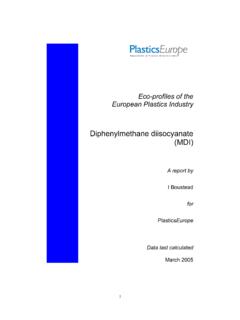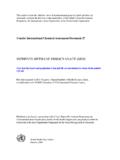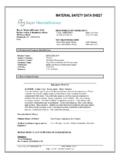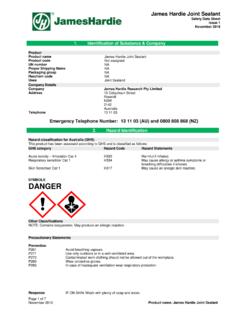Transcription of MATERIALS SAFETY DATA SHEET FOR CHEMICAL …
1 FOR CHEMICAL EMERGENCY During Business Hours: (800) 966-3458 Outside Business Hours: (800) 420-7186 GORILLA GLUE Stronger Faster MSDS Page 1 of 5 1. IDENTIFICATION OF PRODUCT Product Name: Stronger-Faster Gorilla Glue Product Type: Polyurethane adhesive Distributor: The Gorilla Glue Company 4550 Red Bank Expressway Cincinnati, OH 45227 Tel: (513) 271-3300 Fax: (513) 527-3742 2. HAZARDS IDENTIFICATION Harmful by inhalation. Irritating to eyes, respiratory system and skin. May cause sensitization by inhalation and skin contact. NFPA: Health 2, Flammability 1, Reactivity 1 0=Insignificant 1=Slight 2=Moderate 3=High 4=Extreme HMIS: Health 2*, Flammability 1, Reactivity 1 0=Minimal 1=Slight 2=Moderate 3=Serious 4=Severe *=Chronic Health Hazard 3.
2 COMPOSITION/INFORMATION ON INGREDIENTS CHEMICAL name CAS No. % content Urethane prepolymer trade secret 35-55 Polymeric MDI* 9016-87-9 45-65 *Polymeric MDI is a mixture of 4,4 -Diphenylmethane-diisocyanate, isomers and homologues. 4. FIRST AID MEASURES Inhalation If aerosol or vapor is inhaled in high concentrations: Move affected individual to fresh air and keep him warm, let him rest. If there is difficulty in breathing; call a doctor. Eye contact Flush eyes for at least 10 minutes while holding eyelids open. Contact a doctor. Skin contact Remove contaminated clothes immediately, and wash skin with a cleanser based on polyethylene glycol or with plenty of water and soap. Consult a doctor in the event of a skin reaction.
3 Ingestion Product is not intended to be ingested or eaten. If this product is ingested, it may cause gastro- intestinal blockage. If ingested, it may cause severe irritation of the gastrointestinal tract, and should be treated symptomatically. Do not induce the patient or animal to vomit. Call a doctor, ambulance or seek veterinarian assistance immediately. 5. FIRE FIGHTING MEASURES Upper flammable limit (UFL): Not determined Lower flammable limit (LFL): Not determined General fire hazards Down-wind personnel must be evacuated. Do not reseal contaminated containers; a CHEMICAL reaction generating carbon dioxide gas pressure may occur resulting in rupture of the container. Dense smoke is emitted when product is burned without sufficient oxygen. When using water spray, boil-over may occur when product temperature reaches the boiling point of water, and the reaction forming carbon dioxide will accelerate.
4 MDI vapor and other gases may be generated by thermal decomposition. MATERIALS SAFETY data SHEET Date Prepared January 28, 2010 2nd Edition FOR CHEMICAL EMERGENCY During Business Hours: (800) 966-3458 Outside Business Hours: (800) 420-7186 GORILLA GLUE Stronger Faster MSDS Page 2 of 5 Special hazards in fire In case of fire, formation of carbon monoxide, carbon dioxide, nitrogen oxide, isocyanate vapor, and traces of hydrogen cyanide is possible. Extinguishing Media Carbon dioxide, dry powder, and foam. In cases of large scale fires, alcohol-resistant foams are preferred. If water is used, it should be used in very large quantities. The reaction between water and isocyanate may be vigorous. Required special protective equipment for fire-fighters Fire fighters should wear full-face, self-contained breathing apparatus and impervious protective clothing.
5 Fire fighters should avoid inhaling any combustion products. 6. ACCIDENTAL RELEASE MEASURES Personal precautions Wear full-protective clothing and respiratory protection as required maintaining exposures during clean-up below the applicable exposure limits. Environmental precautions Do not discharge spillage into drains. Clean-up procedures Remove mechanically; cover remainders with wet absorbent material (e. g. sand, earth, sawdust). After approx. 15 min. transfer to waste container and do not seal (evolution of CO2). Keep damp in a safe ventilated area for several days. 7. HANDLING AND STORAGE Handling Avoid contact with skin and eye. Do not smoke, eat and drink at the work-place. Ventilation: If vapor or mist is generated during processing or use, local exhaust ventilation should be provided to maintain exposures below the applicable limits.
6 Personal protection: see Section 8. Storage Keep product away from sources of alcohols, amines, or other MATERIALS that react with isocyanates. Avoid prolonged heating above 160 C/320 F. Store the product in tightly closed containers in a well-ventilated place and in accordance with national regulations. Keep out of reach of children and animals. 8. EXPOSURE CONTROLS/ PERSONAL PROTECTION For exposure controls see Section 15. Component exposure limits CAS no. Type ppm mg/m 4,4 -Diphenylmethane diisocyanate 101-68-8 OSHA PEL ACGIH (TLV-TWA) Personal protection equipment General: Wear suitable protective clothing, protective gloves and protective goggles/mask. Suitable MATERIALS for SAFETY gloves: Natural rubber/natural latex NR (>= mm) Polychloroprene CR (>= ) Nitrile rubber NBR (>= ) Butyl rubber IIR (>= mm) Fluorinated rubber FKM (>= mm) MATERIALS SAFETY data SHEET Date Prepared January 28, 2010 2nd Edition FOR CHEMICAL EMERGENCY During Business Hours: (800) 966-3458 Outside Business Hours: (800) 420-7186 GORILLA GLUE Stronger Faster MSDS Page 3 of 5 Personal protection equipment (continued) Respiratory protection Required in insufficiently ventilated working areas and during spraying.
7 An air-fed mask, or for short periods of work, a combination of charcoal filter and particulate filter is recommended. Eyes protection CHEMICAL goggles or full face shields are recommended. An eyewash fountain and SAFETY shower should be available in the work area. Contact lenses should not be worn when working with this product. Skin protection Wear special gloves and working clothes to avoid skin irritation or sensitization. Depending on operation, CHEMICAL resistant boots, overshoes, and apron may also be required. Suitable MATERIALS for clothing: Polyethylene/ethylene vinyl alcohol laminates (PE/VAL) has been reported as an effective material of construction for CHEMICAL protective clothing for MDI. 9. PHYSICAL AND CHEMICAL PROPERTIES Physical form.. Liquid Color .. Dark-Brown Odor.
8 Earthy,musty Boiling point .. >300 C Flash point .. >250 C Vapour pressure.. <0,00001 mbar at 20 C (diphenyl-methane-diisocyanate) Specific gravity .. Approx. 1,14 g/cm3 at 20 C Viscosity .. 4,000 7,000 at 25 C (Brookfield sp. 6/20 rpm) Solubility in water .. reacts Percent VOC .. 0% Pour -12 C ( F) 10. STABILITY AND REACTIVITY Stability The product is stable under the recommended handling and storage conditions (see section 7). Hazardous decomposition products By exposure to high temperature, hazardous decomposition products may develop, such as isocyanate vapour and mist, carbon dioxide, carbon monoxide, nitrogen oxide, and traces of hydrogen cyanide. Hazardous reaction Exothermic reaction with amines and alcohols; reacts with water forming heat,CO2, and insoluble polyurea.
9 The combined effect of CO2 and heat can produce enough pressure to rupture a closed container. 11. TOXICOLOGICAL INFORMATION Acute Oral Toxicity LD50 rat: > 2,000 mg/kg Acute Inhalation Toxicity LC50 rat: 490 mg/m , aerosol, 4 h Skin Irritation rabbit, slight irritant Inhalation Over-exposure may cause irritating effects on nose throat and respiratory tract. Skin contact Prolonged or repeated contact may result in tanning and irritating effects. Eye contact Over-exposure may cause irritating effects on eyes. MATERIALS SAFETY data SHEET Date Prepared January 28, 2010 2nd Edition FOR CHEMICAL EMERGENCY During Business Hours: (800) 966-3458 Outside Business Hours: (800) 420-7186 GORILLA GLUE Stronger Faster MSDS Page 4 of 5 12. ECOLOGICAL INFORMATION Do not allow the product to escape into waters, wastewater or soil.
10 Biodegradability 0% after 28 days Bioaccumulation Does not bioaccumulate. Acute toxicity to fish LC0 > 1,000 mg/l (Zebra fish, Brachydanio rerio) 96 hrs. Toxicity for daphnia EC 50 > 1,000 mg/l (24 hrs.) Acute toxicity to bacteria EC 50 > 100 mg/l (3 hrs.) 13. DISPOSAL CONSIDERATIONS The product remnants are classified as CHEMICAL waste. Dispose of waste according to Local, State, Federal, and Provincial Environmental Regulations. 14. TRANSPORTATION INFORMATION No classification assigned to: Land transport (DOT) / Sea transport (IMDG) / Air transport (ICAO/IATA) 15. REGULATION INFORMATION This product and its components are listed on the TSCA 8(b) inventory. United States Federal Regulations OSHA Hazcom Standard Rating: Hazardous US. Toxic Substances Control Act: Listed on the TSCA Inventory.






